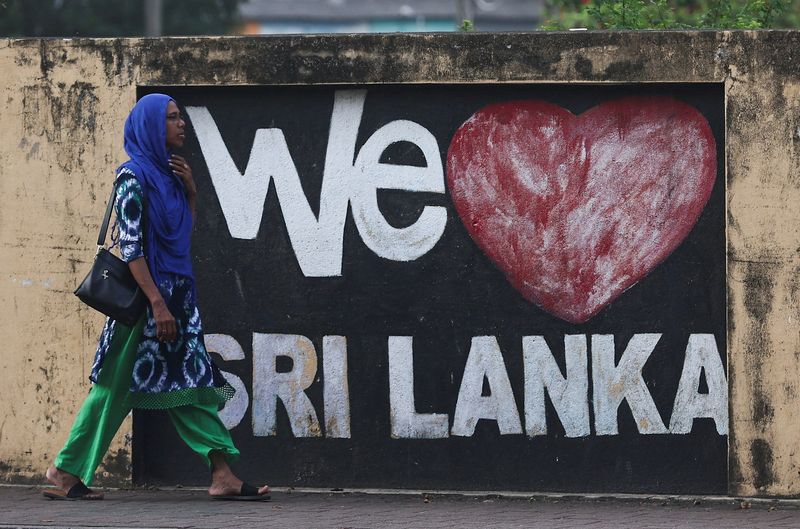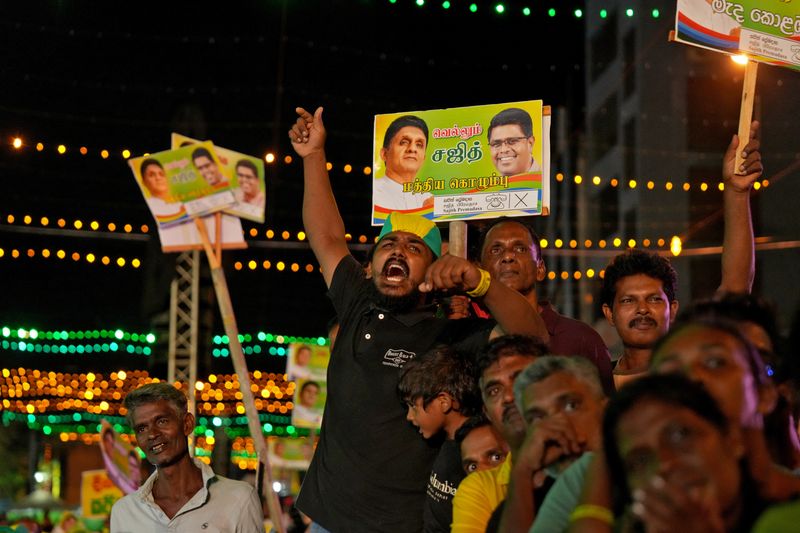By Sudipto Ganguly and Uditha Jayasinghe
COLOMBO (Reuters) - Sri Lankans will vote for a new president in a tightly contested election on Saturday, with the outcome expected to determine the fate of fragile economic recovery led by incumbent Ranil Wickremesinghe who is facing off with left-leaning rivals.
The economy, which collapsed in 2022 after a severe shortage of dollars, is one of the key issues for voters, who have struggled with inflation that soared to as much as 70%, a battered currency and power tariffs that jumped 65%.
Although inflation cooled to 0.5% last month and GDP is forecast to grow for the first time this year in three years, millions remain mired in poverty and debt, with many pinning hopes on a better future on their next leader.
"With many Sri Lankans still struggling to make ends meet, the presidential election promises to be close, tense, and possibly pivotal in setting the country's future political trajectory," said Alan Keenan, the International Crisis Group's senior consultant for Sri Lanka.
The election is shaping to be a close race between Wickremesinghe, opposition leader Sajith Premadasa, and Marxist-leaning politician Anura Kumara Dissanayake.
The Sri Lanka Opinion Tracker Survey by the Institute for Health Policy (IHP) shows Wickremesinghe, running as an independent, at third position. Dissanayake is the leading candidate and Premadasa of the centrist, more Left-leaning Samagi Jana Balawegaya (SJB) party is second.
Both Premadasa and Dissanayake have said they may tinker with taxes and public expenses linked to a International Monetary Fund bailout programme. Dissanayake has also proposed a new homegrown approach to the debt restructuring.
RUN-OFF LIKELY
About 17 million of Sri Lanka's 22 million people are eligible to vote in the first election since protests against the economic hardships in 2022 forced then president Gotabaya Rajapaksa to flee the country and later resign.
Wickremesinghe, a former prime minister who was chosen by parliament to serve out Rajapaksa's term, has managed an uncertain recovery anchored by the $2.9 billion IMF bailout programme and a $25 billion debt restructuring process.
Sri Lanka's first-past-the-post system allows voters to cast three preferential votes for their chosen candidates, with the candidate securing 50% of the votes or more declared winner.
If no candidate wins 50% in the first round, there is a run-off to tally preferential votes for the two frontrunners, an outcome analysts say is likely given the close nature of the election.
Most people are expected to put aside their traditional political affiliations and focus more on the economy, said Dhananath Fernando, an economist at Colombo-based think tank Advocata Institute.
The result of the election is expected to be released on Sunday and a new president will be sworn in shortly afterwards.

Whoever wins the election will have to ensure Sri Lanka gets its public finances in order, start repaying foreign creditors, attract investment and complete the four-year IMF programme.
"The main criticism of the government is that it has not shown enough sensitivity or empathy towards the pressing problem of debt restructuring and making sure that the burden of that adjustment is not going to fall on the people least able to bear it," said Paikiasothy Saravanamuttu, head of Colombo think tank Centre for Policy Alternatives.
